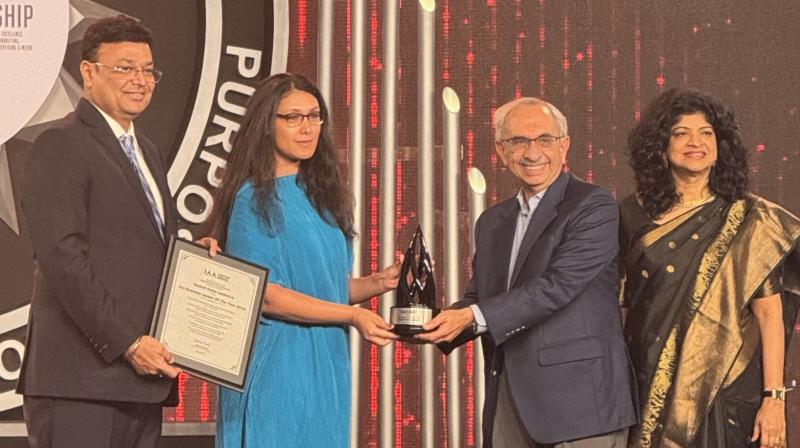After winning the ‘Business Leader of the Year’ title at the IAA Leadership Awards 2024, Roshni Nadar Malhotra took to the stage to talk about how technology can shape the country to compete against the likes of Taiwan, diversity, and more.
She was in conversation with Nandini Dias, chairperson, IAA Leadership Awards, and independent advisor.
The first topic the duo touched upon was generative AI and how it will impact jobs.
Before answering that, Malhotra discussed why many technology companies are looking to set up global capability centres (GCCs) in India.
“India is the technology talent hub of the world. It also helps global companies achieve diversity goals as the country produces the highest STEM (science, technology, engineering and math) talent in the world when it comes to females. Unfortunately, if you look at the data, it’s declining, but it’s still the largest number in the world,” said Malhotra.
Regarding how generative AI will impact jobs, she said, “There will be some jobs that will go through a certain evolution, in the world of generative AI. However, there will be new jobs that will be created. If some companies are reducing headcount, it’s perhaps for a certain segment of jobs, but it doesn’t necessarily mean that opportunities will reduce. I think it will grow.”
She compared AI to the other inflection points in technology like the advent of the calculator.
“Such moments have been part of our evolution. Back in the 70s when the calculator came, everybody was scared and thought that children didn’t need to learn math. Then, we evolved the system of using them (along with students learning math). A few generations later came the search engine. Everybody was looking at information online and there was a certain evolution that took place there too. Then came the iPod and after that shortly came the iPhones and everything was available at fingertips. It evolved and helped consumers,” said Malhotra.
She also added the onus on education institutes.
“With generative AI, it’s impacting the individual and helping in all walks of life. We are figuring out a way to evolve with it. The skills take a while to catch up. Our educational institutions also have a lot of catching up to do. Skills around data engineering, cyber security, and IoT (the Internet of Things) will have to evolve. Educational institutions have to start this if India has to stay ahead,” said Malhotra.
The next topic Dias brought up was semiconductors and how the country fell behind in its manufacturing to the likes of Taiwan.
Malhotra said, “HCL does a lot more on semiconductor design and works with organisations from all over the world. I was in Taiwan last year and I met with leaders of companies. Yes, it’s got the might but one of the leaders rightly pointed out that it took them 40 years to get there. So much of it had to do with the way skills evolved. We (India) have catching up to do, but technology will shrink that time of catching up. Investment in R&D and skills can’t be spearheaded by industries alone.”
Adding to the role of education, she said, “The majority of students in engineering are opting for computer science. For semiconductor design, we need students opting for very different streams of engineering. Intellectual capital through faculty and R&D has to be there to create that workforce.”
She also touched upon how the smaller cities are contributing to India’s technology landscape.
“In 2020, pre covid, there was talent in the big cities. There were centres in the likes of Chennai, Pune, Hyderabad and Noida among others. The evolution post covid is that a lot of talent is now spread across the smaller cities. We are struggling to get people back at work as a lot of people want to work remotely for reasons like bigger cities are more expensive to stay in,” she said.
From 2018 onwards, HCL focused on the smaller cities by opening campuses in places like Lucknow, Vijayawada, Nagpur and Madurai.
On how these campuses helped the technology company, Malhotra said, “Today, we have much higher attendance in these campuses. We have more diversity on these campuses too. In smaller cities, people can stay much closer to work, which means they can do night shifts, and also offer flexibility. Looking at that as an innovation has truly propelled HCL. We have got more than 10,000 people on these campuses and have an overall staff of 2,20,000.”
The talk ended with Malhotra stating how her father Shiv Nadar helped the company’s leadership transfer to her in an ever-evolving landscape.
“The evolution and leadership transition started almost 15 years before it happened. We have had three CEO transitions and two CFO transitions in that period. Such changes prepare the board. When he transitioned out of the board, I had already been on it since 2013. I have been working at HCL since 2008. When he transitioned out of the company as chairperson, he completely left the organisation and the board. That was a mark of a mature organisation and of trust,” she said.
When asked for a piece of advice to leaders, she said, “Have a little faith in young daughters, they are not too bad.”













